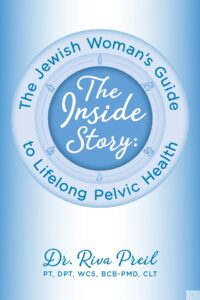Dear Readers,
I have extremely exciting news to share with you that will explain my blog’s silence these past few months. Blood, sweat, toil, and tears have been expended. (Nope, that’s overly dramatic Truthfully, I have only been expending toil, effort, energy, and love) into a different literary project that has been beckoning my attention. The project I am referring to is the book that I have been working on for several years, entitled “The Inside Story: The Jewish Woman’s Guide to Lifelong Pelvic Health.”
That’s right, I have written a book which will be available for purchase within the next few months, with God’s help. My goal in this book is to help ease life cycle transitions for Jewish women. I want to share information about pelvic floor dysfunction and women’s health so that those suffering in silence can seek out appropriate treatment.
I feel so passionately about these topics and have the privilege and pleasure of helping individual women in my professional life. This book will enable me to bring help to an even larger audience. My hope and prayer is that God will help me educate as many women as possible, so that every single woman can have a satisfying and gratifying physical relationship with her spouse and with her own body.
As the title implies, the target audience of this (first) edition of the book is geared towards Jewish women, although the majority of the content is relevant and applicable to all women.
Please don’t get me wrong! I love and respect all women, and I embrace and look forward to the opportunity to share valuable information with EVERYONE in the next edition. That being said, I recognize that there are certain sensitivities that, as a proud, self-identifying Orthodox Jewish woman, I am capable of addressing. I also acknowledge that certain topics that I discuss in the book are considered taboo/uncomfortable, perhaps even more within my community than others. I hope that my affiliation with the Jewish community will help potential readers feel comfortable to read and benefit from my experience. And now that I have expressed in writing that this is only a first edition, you can all hold me accountable to ensure that a follow up version ensues.
So, please stay tuned for further details. I look forward to sharing more information about the book release and how to purchase it in the coming months, and I appreciate your patience with me while I diverted my attention elsewhere.
Yours in educating, enlighting, and helping many women in the coming months and beyond,
Riva




